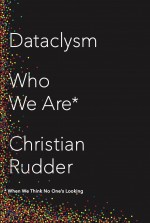Making the Ineffable Totally Effable
by Camilla CassidyMost of us behave differently online than we would ever admit to in real life. What we do on our computers is, within reason, between us and the screen. With the rise and rise of internet dating this unfiltered, unexpurgated version of ourselves has a freer reign to shape the most intimate parts of our lives.
Christian Rudder, co-founder of OKCupid, has used raw data created by the site’s 30 million user profiles, alongside terabytes of information from other sites including Facebook and Reddit, to reveal the things we find attractive when we don’t realise we’re being watched. Rudder has used the OKTrends blog, and now his recently published book, Dataclysm, to show us these hidden dynamics of sexual attraction. ‘This isn’t survey data’, he says. This is human behaviour observed in the wild.
All in all, his findings make pretty uncomfortable reading. Apart from anything else, Dataclysm shows us to be a disappointingly predictable bunch. We might like to think that love and attraction are sacred mysteries but, as Rudder puts it, OkCupid’s strapline could have been ‘Making the Ineffable Totally Effable’.
As a group, we are apparently still pretty racist, ageist and superficial. Race demonstrably affects the number of replies we receive on OkCupid. Men prefer younger women and ‘No matter what he’s telling himself on his setting page, a 30 year-old man spends as much time messaging 18 and 19 year-olds as he does women his own age’. Women, on the other hand, ‘show an admirable openness to both reasonably younger and reasonably older men.’ Though Rudder’s guess is that they might have ‘economic’ motives for this open-mindedness. A ‘Love is Blind Day’ (15th January 2013), on which all the pictures were removed from OKCupid, was a complete flop.
This might all seem blindingly obvious, but only because it confirms the worst stereotypes about our sexual predilections, ones we might have hoped to have left behind us somewhere in the 1950s. As Rudder says, ‘if there’s one thing I sincerely hope this book might get you to reconsider, it’s what you think about yourself.’
There is no doubt of the impact sites like OKCupid have had on our love lives. Rudder writes:
Tonight, some thirty thousand couples will have their first date because of OkCupid. Roughly three thousand of them will end up together long-term. Two thousand of those will get married, and many of them, of course, will have kids. These are children alive and pouting today, grouchy little humans refusing to put their shoes on right now, who would never have existed but for the whims of our HTML.
Frightening data harvesting aside, Rudder has a point when he says that this information can give us an unprecedented insight into how we behave and why. ‘The data was sitting right there on our servers’ he tells us, ‘it was an irresistible sociological opportunity’.
 While his book does range beyond sex and attraction, with OkCupid as its jumping off point, these subjects are bound to remain pretty central to the story. As Rudder puts it, ‘understanding how men and women view sex and beauty differently is essential for a dating site’ but he ‘could use the data to examine taboos like race by direct inspection’. Fundamentally, this book sets out to tell us about ‘sex appeal – how it changes and what creates it.
While his book does range beyond sex and attraction, with OkCupid as its jumping off point, these subjects are bound to remain pretty central to the story. As Rudder puts it, ‘understanding how men and women view sex and beauty differently is essential for a dating site’ but he ‘could use the data to examine taboos like race by direct inspection’. Fundamentally, this book sets out to tell us about ‘sex appeal – how it changes and what creates it.
Christian Rudder, Dataclysm: Who We are (When WeThink No One’s Looking), Fourth Estate, Hardback, 304 pages, ISBN: 978-0008101008. £20.00; (Kindle) £4.72 (paperback) £7.87

